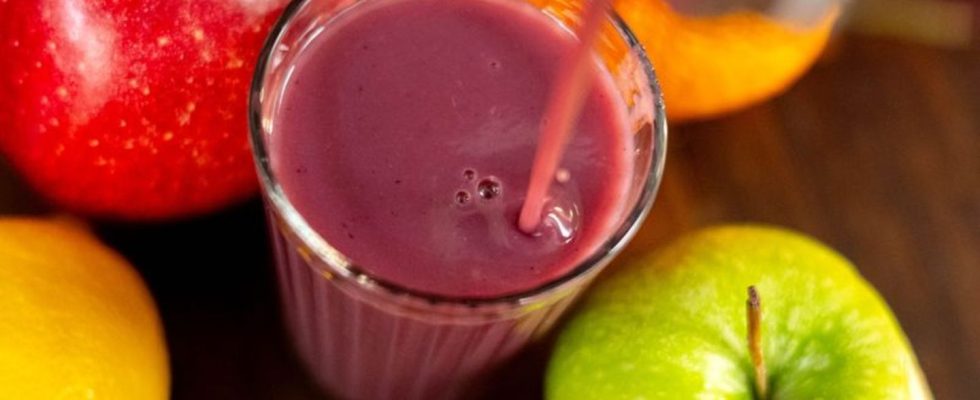On the test bench
Is that really healthy? About myths about food
Should it really be better to eat fruit with the peel on? photo
© Sina Schuldt/dpa
Fruit should be eaten with the peel on and coffee removes water from the body. Many people are familiar with these and other nutritional myths. But not all of them have any truth.
Trials and confusion are almost part of the topic of nutrition. Whether something is healthy or not – it’s up to you Nutrition myths through media and internet. But what exactly does that mean? The Paderborn nutritionist Lars Libuda sees them as rules for eating behavior that are not based on scientific findings. If they are known to larger parts of the population and may even be used, one could speak of nutritional myths.
The reasons for the spread are diverse: Among other things, it could be that new findings from studies are being overinterpreted, says the professor at the Institute for Nutrition, Consumption and Health at the University of Paderborn. It cannot be ruled out that individual points were intentionally placed or at least kept alive. Some foods are enriched with vitamins to make them appear particularly healthy. “Then this myth that we all have a deficiency in various vitamins and therefore need such fortified products can definitely help the product sell better.”
But what happens when you check the truth of nutritional myths? Do some turn out to be errors or even lies?
Claim: Certain fruits and vegetables such as apples or cucumbers should not be peeled. Because there are a lot of vitamins under the shell.
Rating: Correct.
Facts: Philine Lenz, consultant at the Federal Center for Nutrition (BZfE), says: “That’s actually the case.” Of course, the vitamins and minerals are not only contained in the peel, but in the whole fruit and vegetables. But the portion under the shell is one of the highest. “And that’s why it’s best to eat them unpeeled.” If you rinse such fruits and vegetables thoroughly and rub them with a cloth, you can be quite sure that the food is free of dirt and any pesticide residues.
Claim: Gluten-free products are healthier than those containing gluten.
Rating: Inaccurate.
Facts: This is generally not true. People with intolerance or intolerance to gluten should pay attention to a gluten-free diet. But others have no proven benefits from such a diet, according to a report from Harvard Medical School. According to the German Nutrition Society (DGE), eliminating individual foods without a diagnosed intolerance can even increase the risk of nutrient deficiencies and lead to long-term health problems.
Claim: A smoothie is just as healthy as fruit and vegetables in one piece.
Rating: Inaccurate.
Facts: It is true that a smoothie can occasionally replace a portion of fruit and vegetables. The DGE also gives this tip. However, it is generally better to eat these foods in one go. Because chewing makes you spend longer, and the larger volume contributes more to satiety, says BZfE speaker Lenz. According to her, a certain proportion of ingredients can be lost in smoothies from the supermarket through processing, transport and storage. Nevertheless, it is better to have a smoothie than no fruit or vegetables at all.
Claim: Coffee removes water from the body.
Rating: False.
Facts: The state of science on this topic has changed in recent years. Coffee does have a diuretic effect. However, according to Lenz, the description of coffee as a “liquid robber” is outdated. You can cover some of your daily fluid needs with coffee. The DGE also sees it that way. However, according to the BZfE, you shouldn’t drink more than four to five cups a day.
Distrust of simple solutions to complex problems
But what can consumers do if they don’t know what to think of nutritional advice? Nutritionist Libuda says it is not easy for laypeople to correctly classify myths. He advises to be skeptical whenever simple solutions to complex problems are given.
The recommendations of specialist societies such as the DGE are also helpful. Checking whether nutritional advice can also be found there could be a first step in checking the question. If you don’t find anything there, you theoretically have to research the study situation, says Libuda. “That’s actually not affordable for the average consumer.” You should be careful if a product is advertised alongside the nutritional advice: “Then I would be skeptical, I have to say.”
Federal Ministry of Agriculture on smoothies as a replacement for fruit and vegetables (Compass Nutrition 2/2021, p. 5) BZfE on smoothies as a replacement for fruit and vegetables Website of the healthy nutrition department at the BZfE BZfE on peeling fruit and vegetables Federal Consumer Association on gluten-free nutrition DGE on gluten-free diet DGE on smoothies as a substitute for fruit and vegetables BZfE on the consumption of coffee All information about the dpa fact checks DGE on the consumption of coffee Federal Association of Consumer Organizations on the consumption of coffee Harvard University School of Public Health on gluten consumption Harvard Health Publishing on the consumption of gluten Contact page for the BZfE fact check team on vitamins under the peel in apples Nutrition tips from the German Society for Nutrition University Hospital Freiburg on gluten-free nutrition https://www.dpa.com/faktencheck https://www.dpa.com/index.php?id =1384&ADMCMD_editIcons=1#contact

